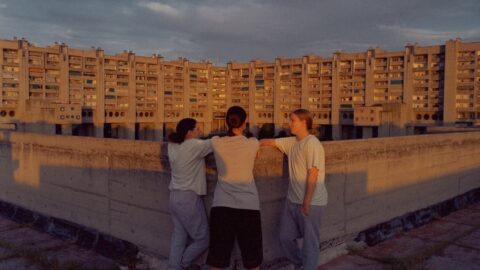Fantasy is THAT GIRL. She’s confident, funny, gorgeous, going back to school and completely unbothered by living in an apartment block full of bigoted assholes. The eponymous transgender character at the heart of Kukla’s new drama Fantasy (2025), played by Alina Juhart, steps into the lives of a tight-knit group of tomboys living in Slovenia and changes everything.
If that sounds like the film presents its trans lead as a kind of magical figure with transformative powers — well, you’re not entirely wrong.
But the film quickly complicates that idea. Set against the backdrop of a suffocatingly patriarchal environment where women are boxed in by expectations, threats, and controlling men — it’s tempting to read Fantasy as a symbolic fixer, dropped into the story to liberate the other women. In fact, the film plays into that reading at first. Her entrance is marked by a surreal, simmering sound cue that reappears later, framing her as a mystical presence. But as the narrative unfolds, it becomes clear she’s not just here to rescue anyone — she’s dealing with her own shit, too.
Like Mosquitoes (Nicole and Valentina Bertani, 2025), another Locarno coming-of-age film, Fantasy blends grounded realism with subtle surreal touches. The haunting opening scene feels almost sci-fi: three girls stand on a balcony, watching as the city’s buildings slowly lift into the sky. That trio — sporty, tomboyish, and close— are all struggling with oppressive home lives. Sina (Mina Milovanović) endures her controlling brother’s shouty, sexist tirades: “Behave like a woman!” Jasna (Mia Skrbinac) lives with a judgmental, hoarder mother who doesn’t hold back, telling her: “You’re not normal.” Mihrije (Sarah Al Saleh), the quietest of the three, faces the looming threat of an arranged marriage.
Mihrije emerges as the emotional centre of the film, and it’s through her that we meet Fantasy — in the guidance counsellor’s office, a space that brings its own hostile microaggressions toward both characters. Sina and Jasna are initially suspicious, even a little cruel, calling Fantasy a “freak.” But Mihrije is instantly drawn to her, and as the four begin spending more time together, the group dynamic starts to shift. The film uses their evolving relationship to explore how femininity can mean radically different things depending on context. For the cis girls, femininity is something to reject — a performance they resist by wearing baggy streetwear, boxing and playing ball with boys, and refusing to soften themselves for the male gaze. For Fantasy, femininity isn’t performative; it’s essential. Her desire to wear pink, do her makeup and feel “girly” isn’t about attracting attention; it’s about feeling at home in her own body. The film captures a powerful truth: for cis women, femininity can feel like a trap; for Fantasy, it’s a way out. Gender expression, it suggests, can be both a burden and a lifeline — depending entirely on where you’re starting from.
As the story deepens, Fantasy becomes more than a catalyst for the others — her interior world starts to unfold. There’s a subtle thread running through the film that some non-queer viewers might miss. She does explain that she’s been in love with a “chaser” (a man who often pursues trans women), but later, in two brief scenes, Fantasy casually mentions knowing certain male characters (like one of the girls’ brothers and Sina’s coach) in a way that raises eyebrows. She doesn’t elaborate, but the implication is clear to anyone who’s familiar with trans women’s experiences: these hypermasculine men who ridicule her in public are secretly drawn to her, possibly even sleeping with her on the DL. It’s a blink-and-you-miss-it but searing commentary on the hypocrisy of transphobia and objectification many trans women endure.
Tension increases in the second act, when Mihrije accompanies Fantasy to her village in Macedonia to visit her ailing father. There, Fantasy retreats into boy drag — no makeup, big sunglasses, barely speaking. She doesn’t correct family members when they congratulate her on finding a “wife.” These scenes are brief but poignant, offering essential insight into how much of herself Fantasy must suppress just to survive in the place she came from. A moment in which she buys a big bottle of liquor to numb the pain really says it all.
Meanwhile, the film’s other storylines push toward their breaking points. Sina has been secretly hooking up with her married boxing coach — a dynamic that’s slowly unravelling her and forcing her to present herself in ways that don’t feel true. Jasna, sensing the shift, begins planning her exit from the group entirely, marking the change with a bold transformation of her own. And at the heart of it all is Mihrije and Fantasy’s blurry “are we friends or something more?” relationship, which builds toward a moving, painful crescendo.
Kukla closes the film on an honest note, suggesting that part of growing up is letting go of the fantasies we’ve built — about love, friendship, identity, and belonging — and facing the future as we really are.
Editor-at-large Jared loves movies and lives with Kiki in Berlin.





